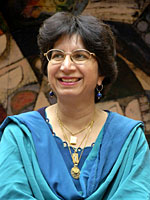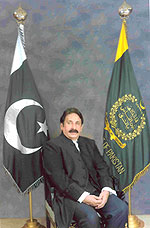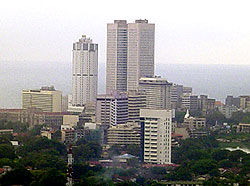Analysis
 |
THE JUDICIAL CRISIS IN PAKISTANby Associate Professor Yasmeen, Director, Centre for Muslim States and Societies, University of Western Australia syasmeen@cyllene.uwa.edu.au |
|
Since being sworn in as Chief Justice in June 2005, Chaudhury had demonstrated a preference for judicial activism, which stems from his view that justice encompasses political, economic and social aspects. Instead of the generally established pattern of the judiciary remaining on the sidelines and condoning the executive’s decisions, Chaudhury opted for taking his own action on various issues. For example he decided to prohibit the annual kite-flying
festival of Basant because of the many casualties and deaths it caused.
The festival regularly attracted many visitors to Lahore, the capital
city of Punjab, including people from across the border in India. It
had become a major income earner for businesses. The Punjabi government
therefore wanted it to continue but was told by the Supreme Court that
it would not condone something that was inimical to the interest and
safety of ordinary citizens. |
This judicial activism was also apparent in Chaudhury’s approach to the issue of missing persons. Since its involvement in the War on Terror, Pakistan’s intelligence agencies have been cooperating with the United States in tracking down militants. The process has not always been transparent, causing human rights organisations to question whether suspects are being denied natural justice and family members to demand to know the fate of their loved ones. The Chief Justice has also expressed concern at the failure of the government and the intelligence agencies to provide adequate information on the whereabouts of missing persons. By doing so, he has indirectly challenged the right of intelligence agencies to deny citizens their rights in the name of countering militancy. |
Those groups affected by the Chief Justice’s activism played a major role in convincing the President of the need to rein him in. The negative reaction to Chaudhury’s suspension from the public and lawyers in Pakistan appears to have surprised those who made this ill-considered decision. So strong has been the backlash that President Musharraf has reportedly been considering strategies for damage-limitation. Some have suggested that Prime Minister Shaukat Aziz may lose his position in the process. But that may not solve the problem. President Musharraf may have to engage alternative political players, including Benazir Bhutto and Nawaz Sharif. This, in turn, may pave the way for another phase of less-guided democracy in Pakistan. Links
|

FROM A BANANA TO A PYJAMA REPUBLIC: SRI LANKA AND GLOBALISATIONby Dr Neil Dias Karunaratne, School of Economics, University of Queensland n.karunaratne@economics.uq.edu.au |
| The process of economic globalisation has its origins in antiquity but recent innovations in information and communications technology (ICT) have speeded up the process. ICT has turbo charged cross-border capital flows, for better and for worse as was seen when financial crises rocked the world economy in the late 1990s. Trade liberalisation or the removal of tariff and non-tariff barriers is another of the forces driving economic integration. However, while advanced countries engage in the rhetoric of free trade, they often fail to reduce protection because electoral pressures find them pandering special interest groups. Developing countries have also pursued protectionist policies. For example, in the mid-1960s Sri Lanka adopted a strategy of import substituting industrialisation (ISI) to promote infant industries. Under the scheme, state-owned enterprises were to replace imports by producing goods for the domestic market. These ISI industries were not able to compete in the world market and were doomed to fail. About the same time a group of High Performance Asian Economies (HPAEs) adopted the strategy of export-oriented industrialisation (EOI), which delivered spectacular growth rates. The HPAEs were hailed as the Asian Miracle. When Sri Lanka obtained political independence in 1948,
in per capita income terms it was far ahead of the Asian Miracle economies.
But the pursuit of protectionist policies slowed the growth of the economy
until 1977 when Sri Lanka adopted its own EOI strategy. Growth and per
capita income increased dramatically. The economy was transformed from
a plantation economy to a manufactures export economy: from a banana
republic to a pyjama republic. Unfortunately, the EOI strategy was not
accompanied by effective redistribution policies, resulting in widening
income inequality, civil unrest and increased ethnic tensions. |
In 1997, the sudden reversal of short-term capital inflows devastated the miracle Asian economies. This raised serious doubts about the wisdom of capital account liberalisation and shed light on the differences between short and long-term capital flows. Short-term capital flows are mainly financed by debt. They are the hot money that comes in search of quick speculative profits and can wreak economic havoc. These flows are the whipping boy of anti-globalisers. Equity finance or foreign direct investment (FDI) or long-term capital flows bring the magic package of technology, managerial and marketing skills. These play a vital role in promoting growth and improving per capita.In configuring the correct macroeconomic policy-mix for a globalising economy like Sri Lanka, policymakers need to recognise the challenges posed by the existence of the open economy trilemma which demands that they choose only two of three policy regimes:
Until recently policymakers in Sri Lanka chose options
one and three to address short-term macroeconomic stabilisation goals.
They have now decided to change direction and to float the exchange
rate in order to tap into the global pool of savings. |
The free float of the rupee offers the opportunity to design policies to harness the benefits of the correct brand of capital flows, to galvanise long-term growth and rein in Sri Lanka’s galloping inflation. The forces of globalisation offer developing countries a cornucopia. It is up to them to implement a proper macroeconomic policy mix to achieve short-term stabilisation, which can underpin sustained growth, without the trauma of a financial crisis. However, the bottom line in evaluating whether economic policies have harnessed the benefits of globalisation is the relation of growth to equity. As Joseph Stiglitz has said globalisation should work not just for the rich and powerful but for all people. That remains the challenge for Sri Lanka. Links: SRI LANKA
PAKISTAN
|

Profile
|
This month we profile Professor Kathryn
Robinson, Department of Anthropology, Research School of Pacific
and Asian Studies (RSPAS), Australian National University, and Vice
President of the Asian Studies Association of Australia. |
||
|
I was able to follow up on my new passion through courses on Asia with exceptional scholars like Doug Miles, Michael Allen, Rex Mortimer and (of course) Michael Leigh. At that time also, there were many great Asia scholars coming to Australia from Cornell. My relation to Asia was also heavily influenced by the anti-war movement on campus, and questions of how the developed world related to Asia. The late Herb Feith provided a model for committed scholarship. I wrote my honours thesis on Vietnam. At that time it was not possible to continue postgraduate field research in Vietnam, but I was easily persuaded, by Jim Fox, to 'switch' to the ANU and Indonesia for my PhD research, where my political interests led me to research the development impacts of New Order economic policies. I looked into the impact of a large mining project. Studying at ANU, especially in RSPAS, was a total immersion in Asian studies. It propelled me along that path. Q: What are your current preoccupations?
|
I am also working with an ANU colleague, Andrew McWilliam, and a local NGO on livelihoods in coastal regions of South and Southeast Sulawesi. The new forms of social relations enabled by the Internet is another of my interests. Q: How do these fit into the contemporary scene? In terms of local livelihoods, we are trying to find funds to work with our NGO partner in poor coastal communities in a new Marine Protected Area, to develop strategies whereby livelihoods can be sustained, and conservation zones enforced. Q: What are your hopes for Asian studies in
Australia? I would hope Asian Studies can thrive, develop and continue to engage with the broad range of activities that shelter under that umbrella, from the arcane to the applied. In my own university, Asian Studies is accepted as a core component of the university’s research and teaching profile. I would like to think that other universities would mirror this commitment, but also that Asian Studies could have a bigger impact in schools. The ASAA and its membership can take a critical role here. |
|

Student of the month
 Annette
McClelland is a senior secondary student in Sydney, who is
undertaking the International Baccalaureate Diploma Programme. From
2003 to 2006, Annette lived in Hong Kong. Here she describes the transition
back to Australia: Annette
McClelland is a senior secondary student in Sydney, who is
undertaking the International Baccalaureate Diploma Programme. From
2003 to 2006, Annette lived in Hong Kong. Here she describes the transition
back to Australia: The concept of school is the same everywhere. Children go to school to learn and study. What they are studying for and about is the difference. Many students in Hong Kong study to achieve the highest possible mark for the next exam. It is not about involving yourself in the world around you; it is simply about achieving the knowledge and skills to pass the next test. The focus is on the academic; extra-curricular activities are usually provided but are never compulsory. In addition, every student is striving to be literate in English as English is seen as the universal language of business and success. Learning the many languages and customs of Asia is incredibly difficult and no amount of teaching |
would be able to cover the vastness that is Asia. Yet having some local language skills certainly helps. In Hong Kong the trains are never late, the roads never empty and at no time is it quiet. Almost everyone lives above and below someone else, parks are few and far between and smog is a wound on the cityscape. Hong Kong is the ultimate urban sprawl, reaching out to reclaim its harbour, bridge the gap between neighbouring islands and make itself known to the world. In contrast, Sydney seems quiet. It is not the ‘big smoke’ it is locally thought to be. Public transport is as unreliable as the weather is unpredictable and the smaller population supports a stronger community spirit while Hong Kong encourages independence and self-confidence to be prepared for the world. For an expatriate student, Hong Kong proved to be the place to go to find out quickly who you want to be. Without the distraction of English language television there was time to take up all the other opportunities the island offers: sport, art, extra study and volunteering. Experiencing Hong Kong is invigorating yet it makes you realise the beauty of all things Australian. |

Website of the month
| http://www.siiaonline.org/seapsnet The Southeast Asia Peace and Security Network (SEAPSNet) is a non-governmental information network aimed at bringing together development and security experts on Southeast Asia to share their analysis, explore ideas and promote dialogue on conflict prevention, peaceful development and region-building in Southeast Asia. It was launched by the Nautilus Institute and supported by grants from the Ford Foundation. SEAPSNet News is a twice weekly news summary prepared by the Singapore Institute of International Affairs. Its focus is on peace and security issues particularly those related to terrorism and regional cooperation. |
Recent article of interest
|
The Joint Standing Committee on Foreign Affairs, Defence and
Trade |

Did you know?
| The Australia-India Strategic Research Fund (AISRF) offers funding for collaborative research activities between Australia and India through the AISRF. The Minister for Education, Science and Training, Julie Bishop, recently announced that the first tranche of $4 million will go to 17 projects of research in areas such as nanotechnology, cancer therapeutics and diagnostics and agricultural projects. See https://sciencegrants.dest.gov.au/aisrf/Pages/doc.aspx?name=Outcomes.htm |

Diary dates
|
THE FOLDING WIFE: theatre performance, Sydney, 19 to 25, 25 to 28 April. The Folding Wife by the Manila-based Anino Shadowplay Collective explores what propels people to scatter across the face of the earth and the consequences it has for personal and cultural identity. It contrasts the imagery of a fierce and impenetrable Australian landscape with that of a resilient Filipina. Playwright Paschal Daantos Berry is a Filipino-Australian, who received an Asialink grant to develop the script. 8 pm at Blacktown Arts Centre, 78 Flushcombe Rd, Blacktown (see www.urbantheatre.com.au/folding.html) Email: boxoffice@urbantheatre.com.au or call: 02 9707 2111 DISSECTING DISSECTION IN LATE IMPERIAL AND EARLY MODERN CHINA: LU XUN'S ANATOMICAL AESTHETICS, 24 April, Sydney. Dr Larissa Heinrich, Lecturer in Chinese Studies, Department of Chinese and Indonesian Studies, UNSW, presents this seminar in the Australian Centre for Asian Art and Archaeology Seminar Series at the University of Sydney. For further information contact Gabrielle Ewington: acaaa@arts.usyd.edu.au SBS RADIO COMMUNITY CONSULTATIONS, 26 April Canberra. The new Director of Radio, Paula Masselos, is hosting a public forum at The Hellenic Club, Matilda St, Woden from 5:30 to 7:30pm, at which participants are invited to share their thoughts on SBS Radio services now and into the future. Please register your interest by email rsvp@sbs.com.au THE RISE OF CHINA AND INDIA: A COMPARATIVE ECONOMIC Assessment, 26 April, Melbourne. The eminent development economist Professor Pranab Bardhan, University of California, Berkeley, seeks to explain the two countries’ development and their approaches to economic reform at the present juncture of economic growth and social inequality. 6.30pm at Carrillo Gantner Lecture Theatre, Basement Level, Sidney Myer Asia Centre, University of Melbourne. To reserve a seat, please send an email to Asialink Events at events@asialink.unimelb.edu.au with "China and India Bardhan" in the subject line. SOUTH ASIA ENGAGED, 27-29 April 2007, Los Angeles. The South Asian Studies Alliance is hosting its foundation conference with a focus on how South Asia is being integrated into the world. See http://sasia.org 2ND AUSTRALIA INDIA BUSINESS COUNCIL AIBC - INDIA CONFERENCE, 10 to 11 May, Melbourne. This conference provides a forum to to gain access to India's global networks. The Grand Hyatt Hotel, Melbourne. See http://www.aibc.org.au/index.php/Home/6/0/ ASIACONNECT 2007: NEW OPPORTUNITIES IN ASIA, 18 May, Melbourne. AsiaConnect is Asialink's biennial conference on business and career opportunities This year’s keynote speeches will be delivered by David Hornery, Managing Director, ANZ Asia & Mark Dal Pra, Group General Manager (Long Haul), and Sim-May Leong, Human Resources Manager, Jetstar. 8.00am to 5pm Sofitel - 25 Collins St. Cost: $95 General, $55 Students (lunch included). See http://www.asialink.unimelb.edu.au/ Email asiaconnect@asialink.unimelb.edu.au or call 03 8344 8474. TELLING BALIBO, 23 May, Canberra. Freelance journalist Jill Jolliffe will speak about the 32-year struggle for justice of the families of the five reporters killed in Balibo in 1975. The Asia Bookroom, Lawry Place, Macquarie, 6 pm - 8pm. Entry by gold coin donation for the Living Memory Project. RSVP by Tuesday 22 May books@AsiaBookroom.com CHINA IN AN ERA OF TRANSITION: UNDERSTANDING CONTEMPORARY STATE AND SOCIETY RELATIONSHIPS Call for Contributors to an edited collection by 29 May 2007. This collection, to be edited by Reza Hasmath and Jennifer Hsu, University of Cambridge, will focus on China’s state-society relationship in an era of social transition. Contributors are invited to explore themes such as: |
Development of Chinese Civil Society; State Power and Social Forces; Chinese Public Sphere; Society’s Relationship with Various Levels of Government; Responses from Various Sectors of Society to the Changing Nature of the State. For further information or to contribute, please send an abstract of no more than 500 words and a short professional brief by 29 May 2007 to: Reza Hasmath (rh376@cam.ac.uk) or Jennifer Hsu (jyjh2@cam.ac.uk) CHINESE STUDIES ASSOCIATION OF AUSTRALIA, 10th Biennial Conference, 27-29 June 2007, Brisbane. Griffith University, will be hosting the conference at Southbank in Brisbane. Watch the website for details: http://www.csaa.org.au/news.html 2ND ASIAN AUSTRALIAN IDENTITIES conference,
28-30 June 2007, Melbourne. The organisers welcome papers and
presentations exploring Asian Australian identities, histories, cultures
and politics. All presentations should be of 20 minutes duration. Abstracts
(max 200 words) and a short bio (max 200 words) should be sent to admin@asianaustralianstudies.org
or contact the convenors, tseen.khoo@arts.monash.edu.au
or jacqueline.lo@anu.edu.au CHINA EAST ASIA MEDIA/NEW MEDIA CONFERENCE,
5-6 July, Brisbane. China’s emergence as a manufacturing
behemoth is reshaping the global economy. However, China’s media
and creative industries have not achieved the same export oriented momentum
as its low cost manufacturers. With the Beijing Olympics moving closer
China is mounting a claim for a leading role in the global and regional
cultural economy, drawing on its long tradition as the centre of East
Asian culture. Will this be vision ever be achieved? The conference
will be hosted by the Australian Research Council Centre of Excellence
for Creative Industries and Innovation http://www.cci.edu.au
IN SEARCH OF RECONCILIATION AND PEACE IN INDONESIA, workshop 19 and 20 July 2007, Singapore. The Indonesia Study Group, Asia Research Institute, National University of Singapore is holding an interdisciplinary workshop to examine approaches to reconciliation and peace in Indonesia. Its aim is to provide insights into ways forward not only for Indonesia, but for conflict situations much more broadly. http://www.ari.nus.edu.sg or contact the convenor, Dr Birgit Bräuchler aribb@nus.edu.sg CHINA: Conference on Migration and Social Protection,
25 to 26 September, Beijing. Monash University's Asian Business
and Economics Research Unit together with the Institute of Population
and Labour Economics at the Chinese Academy of Social Sciences and the
Renmin-Monash Advanced Centre for Economic Studies are staging an international
conference to explore issues such as: labour market integration and
social protection, migrant participation in social security schemes,
migrant alternatives to state-sponsored social protection, migrant working
conditions, salaries and wage arrears, and responsibilities of government
in the provision of social protection. See www.buseco.monash.edu.au/units/aberu/ |

You are welcome to advertise Asia-related events in this space. Send details to: fbeddie@ozemail.com.au
Feedback
What would be useful for you? Human interest stories, profiles of successful graduates of Asian studies, more news about what's on, moderated discussions on topical issues? Send your ideas to fbeddie@ozemail.com.au.
About the ASAA
The Asian Studies Association of Australia (ASAA) promotes
the study of Asian languages, societies, cultures, and politics in Australia,
supports teaching and research in Asian studies and works towards an understanding
of Asia in the community at large. It publishes the Asian Studies Review
journal and holds a biennial conference. ASAA and the Centre for Language
Studies at National University of Singapore also co-publish an annual supplementary
issue of the Centre's fully peer-reviewed electronic Foreign Language Teaching
Journal (e-FLT). See http://e-flt.nus.edu.sg
The ASAA believes there is an urgent need to develop a strategy to preserve,
renew and extend Australian expertise about Asia. It has called on the government
to show national leadership in the promotion of Australia’s Asia knowledge
and skills. See Maximizing Australia's Asia Knowledge Repositioning and
Renewal of a National Asset http://coombs.anu.edu.au/SpecialProj/ASAA/asia-knowledge-book-v70.pdf
Asian Currents is published by the Asian Studies Association of Australia (ASAA) http://coombs.anu.edu.au/ASAA/ thanks to a grant from the International Centre of Excellence for Asia Pacific Studies (ICEAPS) http://iceaps.anu.edu.au. It is edited by Francesca Beddie. The editorial board consists of Robert Cribb, ASAA President, Michele Ford, ASAA Secretary, Mina Roces, ASAA Publications officer, Tamara Jacka, ASAA Council member, and Ann Kumar, Director, ICEAPS.

 Pakistan
has entered a new phase of instability since President Musharraf’s
decision of 9 March 2007 to render ‘non-functional’ the
Chief Justice of Supreme Court, Justice Iftikhar Chaudhury. This move
is generally seen as part of Musharraf’s strategy to ensure he
would not face a judicial threat to his re-election as president before
elections take place for a new parliament. While there may be some validity
to such assessments, they ignore the role played by a conflation of
business, military and intelligence groups in this decision.
Pakistan
has entered a new phase of instability since President Musharraf’s
decision of 9 March 2007 to render ‘non-functional’ the
Chief Justice of Supreme Court, Justice Iftikhar Chaudhury. This move
is generally seen as part of Musharraf’s strategy to ensure he
would not face a judicial threat to his re-election as president before
elections take place for a new parliament. While there may be some validity
to such assessments, they ignore the role played by a conflation of
business, military and intelligence groups in this decision.  Chaudhury
also moved to rein in the emerging nexus between the business elite
and the bureaucracy and political interests. For instance, he opposed
the decision by the Privatisation Commission and the Cabinet Committee
of Privatisation to sell the Pakistan Steel Mills. The deal would have
cost the Pakistan Government Rupees (Rs) 18 billion (AUD 355.5 million)
while providing benefits worth Rs 33.67 billion (AUD 665 million), including
the allocation of land free of charge, to the successful bidders. He
has also opposed the sale of government land to politicians, ministers
and bureaucrats on terms that defrauded the exchequer, arguing that
‘state property should not be turned into private property’.
Chaudhury
also moved to rein in the emerging nexus between the business elite
and the bureaucracy and political interests. For instance, he opposed
the decision by the Privatisation Commission and the Cabinet Committee
of Privatisation to sell the Pakistan Steel Mills. The deal would have
cost the Pakistan Government Rupees (Rs) 18 billion (AUD 355.5 million)
while providing benefits worth Rs 33.67 billion (AUD 665 million), including
the allocation of land free of charge, to the successful bidders. He
has also opposed the sale of government land to politicians, ministers
and bureaucrats on terms that defrauded the exchequer, arguing that
‘state property should not be turned into private property’.
 Q:
When did you become interested in studying Asia and why?
Q:
When did you become interested in studying Asia and why?